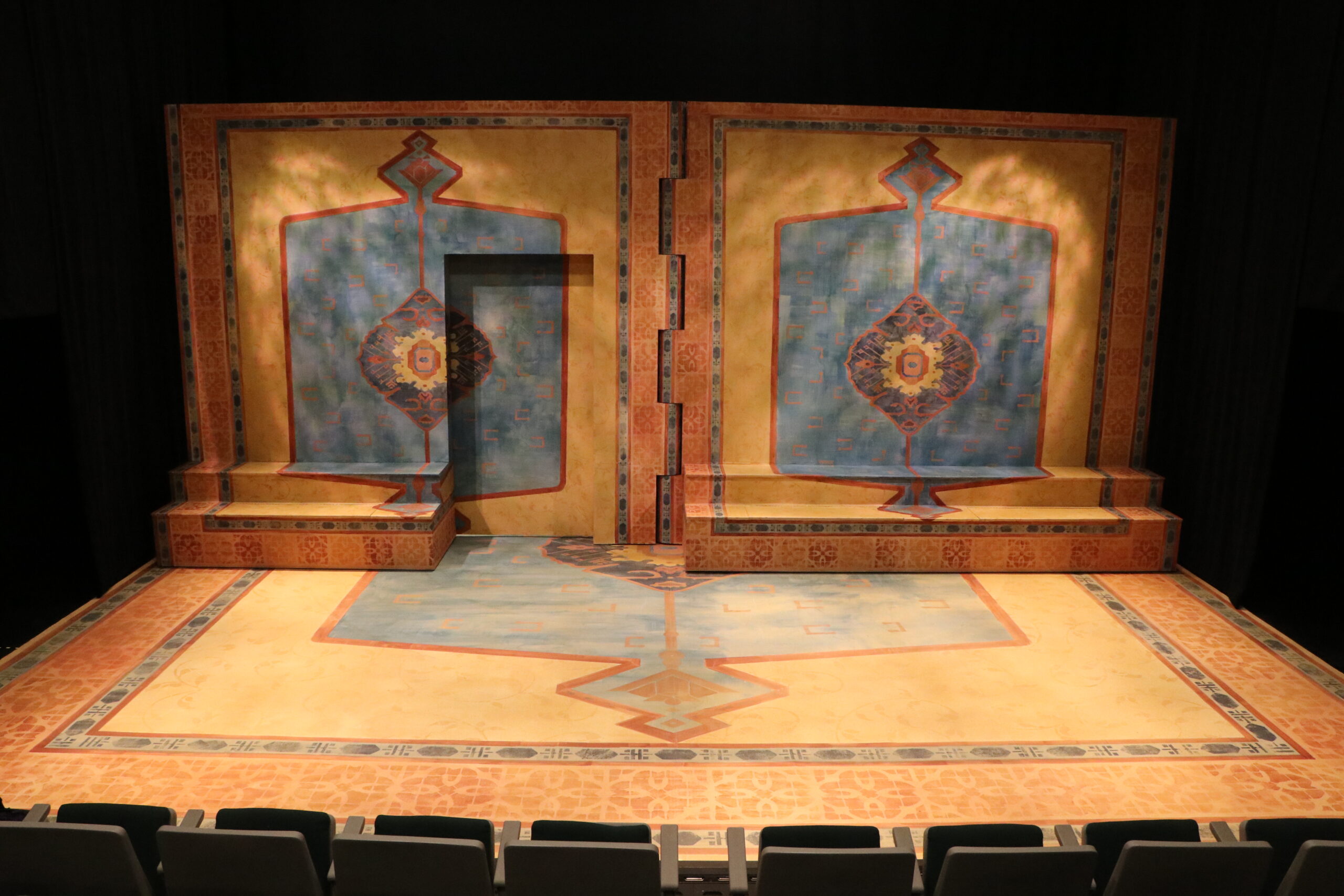Chekhov’s ‘Three Sisters’: dreams and despair through the lens of ordinary life
November 9, 2018
 Ezra Sunshine
Ezra SunshineLaden with what-ifs, Anton Chekhov’s “Three Sisters” comes to vivid, aching life in Wish Theater under the direction of Associate Professor of Theater Abigail Killeen. On a set fantastic in color and intricacy, the interwoven lives of three sisters and their loved ones unfold as time races by. The play is set to open tonight and run through the weekend.
Informed by Chekhov’s observations as a doctor of families during times of distress, “Three Sisters” explores choice, agency, ideas of labor and philosophy through the lives of a Russian family: Maria, Olga and Irina Prozorovna, their brother Andrei and the soldiers who reside with them in their small backwards town. Though separated from the contemporary by distances of time and space, Killeen believes the play has the power to resonate with the audience in a visceral way.
“I think a lot of the theater is about recognizing shared humanity,” she said. “I think students at a small liberal arts school in mid-coast Maine can come to a play written in Russia in 1901 and recognize themselves in it.”
The sisters’ dream of Moscow—the big city, bright lights, a return to a lost time of glamour and happiness—is intimately familiar. But its narrative is a far cry from the typical. Rather, it is an uncomfortable, inescapable reminder that, often, chances do not play out in the dreamer’s favor.
“We have great questions and hopes and dreams that live within us and we still have to live the drudgery of daily life,” says Killeen. “And Chekhov’s plays are about accomplishing daily life, about compromises and the dreams we sacrifice.”
In the small space of Wish Theatre, the set is dynamic and imposing, allowing actors to more fully construct the world of the play. Created by Brittany Vasta, a freelance set designer based in New York City, the two interlocking walls and a door rotate and move throughout the play’s four acts.
“It’s claustrophobic and it’s beautiful. It’s all hand-painted,” said Sally Rose Zuckert ’19, who plays the role of Maria. “It puts the actors right in the audience’s face—they’re inescapable, and it emphasizes the inescapable aspects of our story.”
Although the set is a wonderland, the costuming and acting is pointedly realistic. This reflects the value Killeen places on authenticity, honesty and realism in storytelling.
“We may feel pressure and shame, but that doesn’t mean that’s working out in our daily interactions,” she said. “We’re still fighting our way through, searching for fulfillment and happiness, so [the shame and pressure] is in the environment around them, it’s not what they’re playing.”
This particular adaptation by Libby Appel, Artistic Director Emerita of the Oregon Shakespeare Festival and a passionate Chekhov admirer, is peppered with sharp moments of modernity, which factored into Killeen’s choice.
“Libby Appel’s adaptation is masterful, its thoughtful, it’s thorough, it’s joyful and clear,” she said.
Bringing the text to life is a challenge, which students have risen to eagerly, unpacking its intricacies throughout the rehearsal process.
“Once you do learn what it means, it takes on a fuller meaning in your own life,” said Zuckert. “I’m not saying it like someone from Russia in the 1900s would say it, but I think it’s just as resonant.”
This is especially true for Railey Zantop-Zimlinghaus ’19, who plays the role of Vershinin, a character conventionally cast as a man.
“Decoding Chekhov in the first place is a challenge, and to be making character choices that you know aren’t what the playwright intended—it’s really freeing, but also quite daunting,” she said.
Investigating Chekhov’s many allusions and the myriad connections drawn between characters was an essential part of the rehearsal process.
“You don’t get to the bottom of a text like this, but you can try to give it its due,” said Killeen.
For first years like Blaine Stevens and first-time actors like Hideyoshi Akai ’19, “Three Sisters” has been a space to learn and grow while building relationships.
“It’s such a cool vibe here,” said Stevens. “Just to have the one place where you can come and know I’m not going to be judged; they all want us to succeed.”
“In all of the best possible ways, it’s like getting onstage with your brother and sister, with your family,” added Zuckert.
As the last act finishes, and the last words reverberate in the small black box theatre, Chekhov’s century-old tale is firmly rooted in the now.
“The [strongest feeling] is a deep and sincere melancholy, for what we do and what we don’t do,” said Zuckert. “And I think that’s what the play is about.”
“Three Sisters” will run this weekend in the Wish Theatre, with 7:30 p.m. shows tonight and Saturday and 2 p.m. on Sunday.

Comments
Before submitting a comment, please review our comment policy. Some key points from the policy: